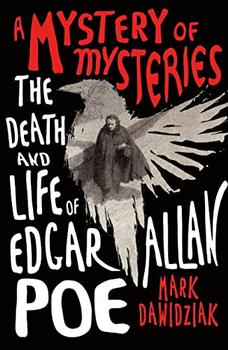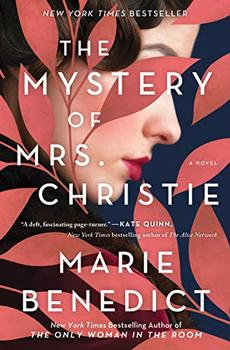Summary | Excerpt | Reviews | Beyond the book | Read-Alikes | Genres & Themes | Author Bio

The Death and Life of Edgar Allan Poe
by Mark DawidziakEdgar Allan Poe biographers have an advantage over other writers because they don't have to come up with a hook. Their subject, the still-famous author of "The Tell-Tale Heart" and other spine-tingling treasures, took care of that by dying like one of his characters might have; at a premature age, of undetermined causes, soon after being discovered on a Baltimore street, delirious and wearing someone else's clothes. It's standard to wonder: Was he marked for death? Haunted? Born under a bad sign?
Yet in this enlightened century, when we've used artificial intelligence to scan Poe's writings for thought patterns consistent with clinical depression, when we've tested extant locks of his hair for traces of lethal chemicals that may have entered his system via a loose gaslight, most of us probably don't honestly view the unexplained phenomenon of his death as particularly sensational. Besides, in Poe's lifetime, when tuberculosis took one in seven lives, wasn't everyone kind of cursed by our standards?
The author of A Mystery of Mysteries: The Death and Life of Edgar Allan Poe, film and television critic Mark Dawidziak, wants this new biography to leave you curious about the complexities of the masterful poet and storyteller's life, rather than satisfied with a tall tale, which modern fans still sometimes prefer in spite of all the unromantic truths that belie it. The so-called godfather of horror also invented the Holmesian detective archetype and wrote a tongue-in-cheek creative writing manual, as well as a sincere "Essay on the Material and Spiritual Universe," which Einstein would call "a beautiful achievement."
Dawidziak gets the shallow but stubborn misconceptions about Poe's appearance out of the way first. Rather than a gloomy, ghoulish wreck, as popular media, merchandise and psychoanalytic criticism suggest, Poe was a robust and dynamic gentleman for the unphotographed majority of his life. Athletic and playful, he would challenge visitors to outdoor leaping games even as an adult. He could be witty and tender, and was "profoundly excited by music."
He was also egotistical (he declared "The Raven" "the greatest poem that ever was written"), an elitist who was scandalized when members of the merchant class started attaining the high status of planters, as racist as the next white antebellum Virginian, by turns blindly optimistic and tortured (an angle he often played up to get sympathy and much-needed funds). He married his 13-year-old cousin too, and had a habit of getting involved in ugly feuds over literature and women as soon as good fortune came his way. A weakness for alcohol, the severity of which is debated, was another means of self-sabotage.
It's not a great leap to blame some of Poe's faults on a series of early traumas. He was the son of one gifted and one hopeless actor, his mother and father respectively. His father abandoned the family when Edgar was two and his mother died of "consumption" a year later. He was taken in by the philanthropic Allan family of Richmond, Virginia. John Allan, the patriarch, loathed the concept of dependence and treated young Edgar like a charity case for the duration of their relationship, ensuring that the boy was never formally adopted. Instead of inheriting a piece of his foster father's fortune like he hoped, the orphan got nothing, and was left to endure immense financial woes. No wonder he had a profoundly needy personality.
What sounds like a recipe for failure may be the reason Poe is a household name today. If he had been economically free to pursue his passions, he probably would have wound up a knock-off of his hero Lord Byron, a footnote in the history of American romantic poetry. But, as it happened, there was a market for horror and mystery stories, led by now-forgotten bestselling authors Charles Brockden Brown and George Lippard. It was by exquisitely exploiting that market that "Eddy," as his mother-in-law affectionately called him, became known as "The Raven Man" across the nation; children followed him along the street, throwing stones at his heels so he would do his catchphrase: "Nevermore!" He had five years to relish his fame.
A Mystery of Mysteries pivots between two timelines until they meet: Poe's entire life story and his final days. This novelistic technique is apt given the subject's affinity for building suspense by artfully arranging the facts. We know the young Poe's ultimate fate (sort of) but not how exactly he arrives there, so we're constantly revising our expectations. The concept of "known-unknowns" is thematic to this biography as well as to Poe's macabre works. As human beings, we are aware of our limits, know that we will eventually decline and die, but we don't know how it will go down, we might never.
Though Dawidziak arranges Poe's life into a gripping story, he emphasizes objectivity and research. At the very beginning, he disabuses the reader of the notion that any serious biographer knows how Poe died with complete certainty. A supposed quest for his cause of death is valuable only insofar as it turns the reader's attention to the underappreciated "knowns" of his life, many of which inspire even more unanswerable questions.
A potentially disappointing aspect of this book, besides its slimness, is its copious use of quotations from other biographies, scholars and famous Poe acolytes like Stephen King and Arthur Conan Doyle. Many of the most insightful analyses of the life and work presented are not Dawidziak's. For instance, it's the curator of the Edgar Allan Poe Museum in Richmond, Chris Semtner, who, observing Poe's hypocritical class pretensions, notes, "He always [seemed] to be straddling different worlds. He [seemed] to have the ability to be on the inside yet remain the outsider at the same time." Still, it's Dawidziak who convincingly extends this reading to Shakespeare and Twain, literary giants who also captured and fundamentally changed the broad cultural imagination. He additionally devises a compelling unified theory of Poe's various genre choices, which were manifestations of his inner contradictions: the horror author points out unexplainable problems; the mystery author believes there are logical solutions; the poet searches for unity; the critic searches for high ideals.
A Mystery of Mysteries is a fine entry point into the reality of a legendary figure that will get you puzzling out the ambiguities of existence in the same half-skeptical, half-awestruck frame of mind as America's foremost mystery writer. Death is unresolvable, but it's pleasant to marvel at the complex ways mortals have attempted to cheat that fact, to give death a face and a meaning, however frightful. Few have tried as craftily as Edgar Allan Poe.
![]() This review
first ran in the March 15, 2023
issue of BookBrowse Recommends.
This review
first ran in the March 15, 2023
issue of BookBrowse Recommends.

If you liked A Mystery of Mysteries, try these:

The Invention of Charlotte Brontë
by Graham Watson
Published 2025
A profoundly moving, ground-breaking biography that challenges the established narrative to reveal the Brontë family as they've never been seen before.

by Marie Benedict
Published 2021
A master storyteller whose clever mind may never be matched, Agatha Christie's untold history offers perhaps her greatest mystery of all.
Your guide toexceptional books
BookBrowse seeks out and recommends the best in contemporary fiction and nonfiction—books that not only engage and entertain but also deepen our understanding of ourselves and the world around us.